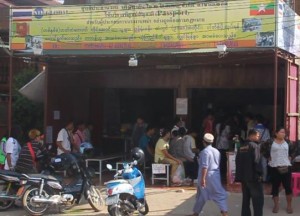Migrant workers from Burma sit on benches in and outside an labor ‘agents’ office on a small dusty road in the back blocks of the Thai border town of Mae Sot. Tiredness is etched on the workers faces as they wait for their names to be called out. Conversations overlap – delays in getting a temporary passport and the various costs needed to pay for getting the necessary documents.
 It is late afternoon on December 13th – one day before the deadline for migrant worker to complete their national verification in Thailand. Large groups of people are still being dropped by a series of Bangkok registered mini-vans in front of the agent office. The swamped office is busy trying to process applications, despite the approaching deadline.
It is late afternoon on December 13th – one day before the deadline for migrant worker to complete their national verification in Thailand. Large groups of people are still being dropped by a series of Bangkok registered mini-vans in front of the agent office. The swamped office is busy trying to process applications, despite the approaching deadline.
The deadline for migrant worker nationality verification is Friday December 14th. Migrant worker advocates estimate that as many as one million workers from Burma will not be able to meet the Thai government’s deadline for nationality verification.
Thailand’s Employment Department has insisted the deadline will end on the December 14th and have said there are no plans to extend it.
Ko Htway Naing, a legal officer at the Yaung Chi Oo Workers’ Association, an organization that advocates on behalf of workers’ rights, spoke to Karen News.
“There are a lot of migrant workers who haven’t completed the nationality verification process. The majority of migrant workers working in factories do not have any legal papers issued by the Thai authorities. The current situation in Mae Sot now is that there are migrant workers employed at 300 factories and as many as 180 of the factories have workers without any legal papers.”
Workers unable to meet the nationality verification deadline face immediate deportation and advocates warn that this places them at risk of exploitation from rogue officials and ‘job brokers’.
Ko Htway Naing from the Yaung Chi Oo Worker s’ Association said that fearing arrest, migrant workers have already started to make plans to avoid it.
“Many migrant workers in Mae Sot who have not completed the process have been staying on the Myawaddy side at monasteries.”
The Migrant Workers Rights Network (MWRN) and Thailand’s State Enterprise Workers Relations Confederation released an open letter that was sent to the International Labor Organization (ILO) requesting the ILO representative discuss the situation during a meeting with the Thai government on Friday.
Burma’s Deputy Labour Minister Myint Thein, requested the Thai government extend the deadline to June, 2013, to allow Burmese applicants to verify their nationality.
Following a meeting with labor officials from the two countries in Bangkok this week, a Thai government spokesperson confirmed the government would not extend registration for foreign workers to complete the nationality verification process.
A Thai government spokesperson said Thailand had already extended the verification procedures. The verification process initially expired last year, but the ministry sought cabinet approval to extend the deadline to June 14 this year. It was later extended again to December 14.
Deputy Labor Minister, Anusorn Kraiwatnussorn, said legal migrant workers would receive the same 300-baht minimum daily wage as Thai workers when the nationwide wage increase comes into effect on Jan 1.
The YCOWA legal officer Ko Htway Naing said that it is very less likely that majority of migrant workers in Mae Sot area will get the minimum wage. With their low income, they are reluctant to spend their money on the legal papers.
“For migrant workers in Mae Sot, with the money they earn, when they do these legal documents, they are in debt for about four or five months. So, since doing legal papers forced them into debts, they are not willing to do it because they have to support their families back home and they also have to pay for the food, rent and other thing. Looking at the expenses, they don’t want to do it anymore.”
Thai authorities estimate that 886,507 migrant workers have applied for the nationality verification process.
Thai business organizations are concerned that they will not have enough workers for the fishing and construction industries if the government deports migrants.



